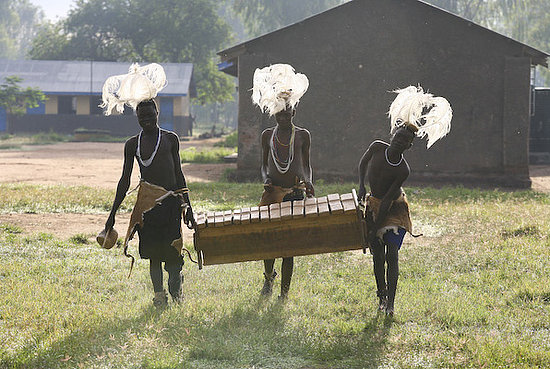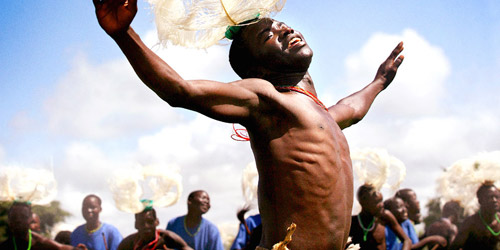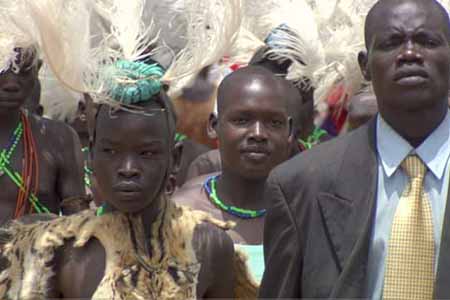War/Dance
Directed by Sean Fine and Andrea Nix Fine;
director of photography, Mr. Fine;
edited by Jeff Consiglio;
music by Asche & Spencer;
produced by Albie Hecht
Running time: 105 minutes.

WHAT THE CRITICS ARE SAYING
New York Times reviewSTEPHEN HOLDEN, New York Times, November 9, 2007
"War/Dance," a visually ravishing documentary that follows a group of schoolchildren from a refugee camp in northern Uganda to a national music competition, raises a fundamental issue for filmmakers confronting unimaginable suffering in war-torn African countries. To what degree should human savagery be softened, sweetened and presented in a spirit of hope to make it palatable to a movie audience?
Directed by Sean Fine and Andrea Nix Fine, this would-be crowd pleaser, which won the documentary directing prize at this year's Sundance Film Festival, is so gorgeous that its beauty distracts from the anguish it reveals. Atrocities are not shown, only recalled in the quiet voices of children who witnessed them, and in some cases committed them under duress.
Every shot in "War/Dance," much of which was filmed in the Patongo refugee camp in northern Uganda, has the polish of a richly hued, impeccably composed illustration. You wonder why the filmmakers felt obliged to shoehorn so many pretty sunsets into the film, which appears to be admiring itself in a mirror.
When individual children, some in tears, tell their stories while gazing directly into the camera, the shots seem posed and their remarks possibly rehearsed. The production notes explain that the children felt more comfortable telling their stories directly to the camera than to an interviewer, but you still have an uneasy sense of being manipulated.
One scene follows a mother and her young daughter as they visit the makeshift grave of the girl's murdered father. As the girl breaks down and sobs, and her sad but dry-eyed mother urges her to be strong, you begin to wonder if the scene is a studious re-enactment.
Having voiced these qualms, let me say that "War/Dance," in spite of its slickness, is an honorable, sometimes inspiring exploration of the primal healing power of music and dance in an African tribal culture. The competition in the capital city, Kampala, is obviously much more than an entertaining talent show. Through music, dance and drumming, the children transmute fear and pain into profoundly cathartic spiritual affirmation.
These ancestral dances are connected to their homeland and their tribal roots (they are members of the Acholi tribe) and ultimately to their core identity. When they perform the Bwola, the tribe's intricate, 500-year-old royal dance, you feel its ritual power healing broken lives.

The children are victims of a 20-year civil war that has cost tens of thousands of lives in northern Uganda which the movie, to its detriment, barely mentions and about which it supplies no historical background. Many were abducted from their villages in the middle of the night by the Lord's Resistance Army, a rebel group that turned kidnapped boys as young as 5 into soldiers and girls into sexual slaves. Many were snatched in front of their parents, and some were forced at gunpoint to beat and kill family members and neighbors.
The movie focuses on three children from the Patongo camp who make the long journey to Kampala in 2005 in trucks guarded by security forces: Rose, a 13-year-old choir singer who witnessed her parents' murder by the rebels; Nancy, a 14-year-old dancer who took charge of her three younger siblings after her father's killing and her mother's abduction; and Dominic, a 14-year-old former child soldier in the Lord's Resistance Army, whose passion is playing the xylophone.
It is the first time that children from the Patongo camp have qualified for the competition, in which more than 20,000 Ugandan schools compete, and expectations of their success are low. In the refugee camp 60,000 people live in squalid, cramped quarters without electricity or running water, and many suffer from malnutrition and disease. Because they come from a war-torn area where resources are scarce, they are looked down on by their southern rivals, who know that many were forced by the Lord's Resistance Army to commit atrocities.
Once the children reach Kampala, "War/Dance" focuses on the contest, which includes some stirring performances in an atmosphere of high excitement. The film draws out the suspense as best it can until the inevitable African-style "American Idol" moment. If that finale is genuinely exhilarating, you are still uncomfortably aware that this ecstatic conclusion doesn't mean the end of the strife or the refugees' troubles. It is a blip of light on a dark canvas.
